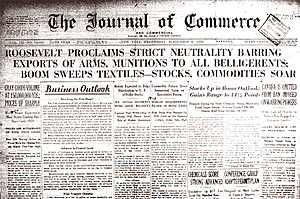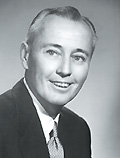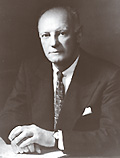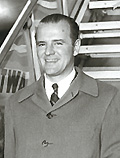 |
|||||||||||||||
|
The 1900's-2000's:
11
12
13
14
15
16
17
18
19
20
21
22
< previous
next >
The JoC's profits boomed during World War I with a sharp increase in advertising and circulation related to the wartime industrial expansion. The growth continued into the early 1920s. Then in 1921, the Dodsworths sold the paper to William C. Reick, who acquired it with money put up by Charles A. Stoneham, the wealthy owner of racehorses and the New York Giants. After Reick died in 1924, Stoneham appointed a new front man, Raphael Govin, who pushed the JoC into more sports coverage. Willis, who had become editor-inchief of the JoC in 1919, watched with alarm as the paper's profits began to dwindle, when everyone else in the Roaring Twenties was making money. After Govin died and the JoC appeared to be on the verge of extinction, the paper was purchased in 1927 by the three Ridder brothers, Bernard H., Joseph E. and Victor F. They were the sons of Herman Ridder, the publisher of the German-language Staats Zeitung, the New Yorker Herald and the Long Island Press.
The Ridder brothers soon built a newspaper empire of their own. They sold the JoC's AP franchise, which was a valuable asset in a day when access to the AP wires was restricted to franchise-holders. This enabled them to buy the St. Paul Pioneer Press-Dispatch. Bernard H. Ridder became publisher of the Pioneer Press-Dispatch, turning the JoC presidency over to Joseph E. Ridder. Willis, who continued as editor, recognized that the stock prices of the 1920s were a bubble and predicted the stock market crash of 1929. But he failed to foresee its duration, which was caused in part by the tightening actions of the very Federal Reserve Bank he had helped create. Believing the Depression would be of short duration, Willis called on the Ridders to invest in the expansion of the paper. But the Ridders, facing declining revenue, had to cut salaries and retrench, causing Willis to resign. He was succeeded by Jules I. Bogen, who, like his mentor, held a Ph.D. in economics. In the tradition of earlier JoC editors, Bogen was an advocate of free trade and opposed the Smoot-Hawley tariffs of 1930, which helped prolong the duration of the Depression by restricting global trade. Though an ardent critic of the New Deal and the policies of President Roosevelt, Bogen welcomed the Trade Agreement of 1935, which eased these tariff constraints on trade. He also welcomed the shipping policies adopted by the Merchant Marine Act of 1936, which provided subsidies for construction and operation of U.S.-flag vessels. Throughout the Depression, JoC salaries were kept low and the staff kept to a minimum. The name of the game in those days was survival at a time when the revenue produced by shipping advertising reflected the downturn in trade and ship sailings.
Censorship of shipping ads and news coverage became the order of the day after Pearl Harbor, but the JoC enjoyed a windfall from a new source. It reprinted all of the new regulations that were promulgated by the alphabet soup of wartime agencies set up to regulate production and supplies. It created an index of regulations in a special War Controls Guide for use by businessmen. There were more than 1,500 wartime regulations in all, many of them amended time and again. The JoC's listings were read voraciously by businessmen trying to comply with their requirements. For some orders the paper sold as many as 3 million reprints. The 1900's-2000's: 11 12 13 14 15 16 17 18 19 20 21 22 < previous next > |
||||||||||||||
| © Copyright 2005 United Business Media. All rights reserved. |
|||||||||||||||



